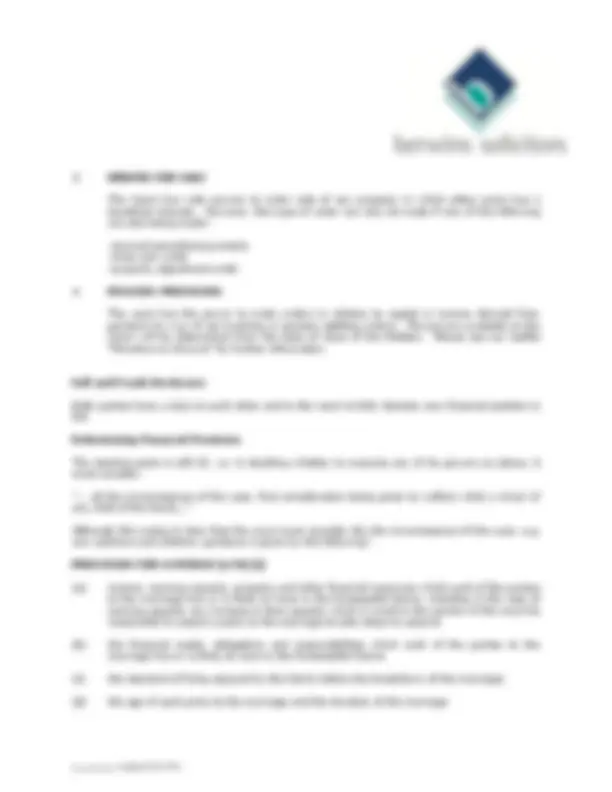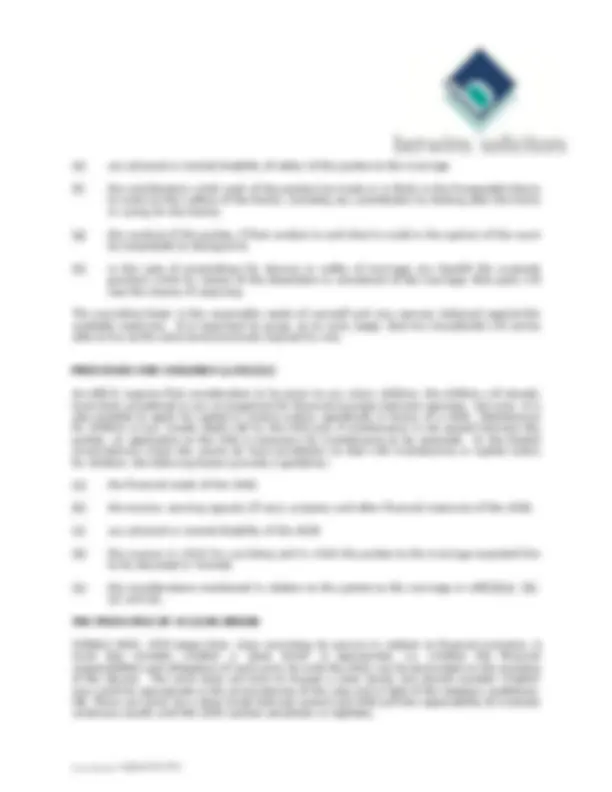





Study with the several resources on Docsity

Earn points by helping other students or get them with a premium plan


Prepare for your exams
Study with the several resources on Docsity

Earn points to download
Earn points by helping other students or get them with a premium plan
Community
Ask the community for help and clear up your study doubts
Discover the best universities in your country according to Docsity users
Free resources
Download our free guides on studying techniques, anxiety management strategies, and thesis advice from Docsity tutors
An overview of financial remedies available during divorce or separation, including different routes such as collaborative law, mediation, and traditional solicitor negotiations. It outlines the types of orders the court can make, including income and capital orders, and discusses the importance of full disclosure and the Section 25 factors in determining financial provision for both spouses and children.
What you will learn
Typology: Study Guides, Projects, Research
1 / 5

This page cannot be seen from the preview
Don't miss anything!




Introduction When separating or divorcing, the most difficult area is usually sorting out the finances. This includes your family home, other assets, pensions and maintenance.
Different Routes Your options to resolve financial matters are:-
Collaborative Law – all of our lawyers are Collaborative Lawyers and, provided your husband/wife or partner instructs another Collaborative Lawyer, we can agree at the outset not to go to court but to resolve matters by round table discussions in which you fully participate.
Mediation – one mediator will meet with both your and your husband/wife or partner to facilitate discussions between you. Please note that, from 6 th^ April 2011, you will have to attend a Mediation Information and Assessment Meeting before issuing any court proceedings to see if this is a suitable way to resolve issues between you (certain exemptions apply).
‘Traditional Route’ – in other words using solicitors to negotiate to hopefully reach an agreement but, failing that, asking the court to decide, by way of an application for financial remedy.
With any of these methods, the requirement is to consider the complete income and capital position of the parties. The aim is to try and achieve a fair outcome, depending on the individual circumstances of this family and their respective needs going forward. The guidelines for this process are known as 'the Section 25 factors', referring to s25 of the Matrimonial Causes Act,
The Powers of the Court
The orders a Court may make fall into two main categories:-
It is normal to include a claim for all possible orders on an application for a matrimonial order. Generally, an application for a financial remedy cannot be heard until Decree Nisi, or take effect until Decree Absolute.
The income orders are as follows:
This is the only order which has effect before the decrees and is for the spouse in urgent need of interim maintenance before the divorce itself is finalised.
More commonly known as maintenance, these are regular payments to a husband/wife for him/herself or on behalf of a child of the family. Please note that maintenance for a husband/wife only lasts until the happening of one of the following -
-death of either the person making the payments or the person receiving them -remarriage of payee (i.e. recipient)
In addition, consideration should be given to whether maintenance for a husband/wife would come to an end if they were to cohabit. The court will also consider whether it is reasonable to limit the duration of the payments, e.g. a return to paid employment after an initial period of re-adjustment, retraining or when children go to school etc.
As above, but an asset has a charge secured against it to ensure that the periodical payments continue.
Any order for maintenance via periodical payments or secured periodical payments is always open to an application for variation, i.e. by either party, to increase or decrease the amount which is being paid, or extend duration of the order. This now includes the power to capitalise maintenance payments.
The capital orders are as follows:-
One party makes a payment of a lump sum to the other. This is usually to redistribute assets or to compensate for maintenance etc. It should be noted that only one lump sum payment is possible, although it may be met by instalments. It is not possible to apply for variation on this type of order, unless it is being paid by instalments.
The Court has wide powers to redistribute family property, including the matrimonial home, including:
-transfer of a tenancy from joint names into the sole name of one party -outright transfer of a property from joint names into the sole name of one party (NB. Requires consent of any mortgage company) -deferred trust for sale, i.e. one party remains in the property until a 'trigger event' occurs, e.g. children finish education or the party who remains remarries, and then the property will be sold and the proceeds distributed as previously agreed. -deferred charge, i.e. the property is transferred into the sole name of the occupying spouse, but the other spouse takes a charge over the property for (usually) a % of the net proceeds of sale.
(e) any physical or mental disability of either of the parties to the marriage
(f) the contributions which each of the parties has made or is likely in the foreseeable future to make to the welfare of the family, including any contribution by looking after the home or caring for the family;
(g) the conduct of the parties, if that conduct is such that it would in the opinion of the court be inequitable to disregard it;
(h) in the case of proceedings for divorce or nullity of marriage any benefit (for example pension) which by reason of the dissolution or annulment of the marriage, that party will lose the chance of acquiring.
The overriding factor is the reasonable needs of yourself and your spouse, balanced against the available resources. It is important to grasp, at an early stage, that two households will not be able to live at the same level previously enjoyed by one.
PROVISION FOR CHILDREN (s25(3)1)
As s25(1) requires first consideration to be given to any minor children, the children will already have been considered in any arrangement for financial provision between spouses. However, it is also possible to apply for capital or income orders, specifically in favour of a child. Maintenance for children is now mostly dealt with by the CSA and, if maintenance is not agreed between the parties, an application to the CSA is necessary for maintenance to be assessed. In the limited circumstances where the courts do have jurisdiction to deal with maintenance or capital orders for children, the following factors provide a guideline:-
(a) the financial needs of the child;
(b) the income, earning capacity (if any), property and other financial resources of the child;
(c) any physical or mental disability of the child;
(d) the manner in which he was being and in which the parties to the marriage expected him to be educated or trained;
(e) the considerations mentioned in relation to the parties to the marriage in s25(2)(a), (b), (c) and (e).
S25A(1) MCA, 1973 states that, when exercising its powers in relation to financial provision, it must also consider whether a 'clean break' is appropriate, i.e. whether the financial responsibilities and obligations of each party towards the other can be terminated on the granting of the decree. The court does not have to impose a clean break, but should consider whether one would be appropriate in the circumstances of the case and in light of the statutory guidelines. NB. There can never be a clean break between parent and child and the responsibility to maintain continues usually until the child reaches seventeen or eighteen.
You will be specifically advised whether a clean break is appropriate in your particular case, but the length of the marriage will be clearly be an important factor, e.g. short marriage/no children
Summary
Resolving financial matters following the breakdown of a relationship is an art not a science. All needs and resources of the parties are considered; put into the ‘pot’ and redistributed as fairly as possible. Reported cases will give us some guidance, including that there should not be any discrimination between the roles of home-maker and bread winner. It’s about trying to find a solution which fits the requirements and resources of your particular family.
It would be of assistance to our discussions if you could make a detailed note of your assets & liabilities and your income & outgoings, together with your hopes for what you would like to achieve in any settlement.